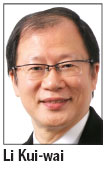The measure, impact, productivity and outcome of economics
Updated: 2013-09-03 07:14
By Li Kui-wai(HK Edition)
|
|||||||||

It would be interesting to consider how economics differs from other social science disciplines, typically sociology and politics. Economics is a study about resources, typically land, labor and capital. Economies that possess similar levels of resources exhibit huge differences in their growth and development outcomes. Economics is a "more or less" subject, meaning that countries, firms, households, families and individuals all possess different endowments and when all individuals have done their best economically, society reaches its maximal growth and development level. Of course, government is still required to deal with social "bad" such as crimes, market failures and infrastructure development.
Individuals conduct their economic activities differently; some work as entrepreneurs and start businesses, while others work as employees to obtain a salary. For sure there is income inequality in society. Indeed, we train people to be unequal, as some receive a higher education and progress well, while others receive lower levels of education and have a lower level of personal endowment. Hence, in Hong Kong, we have inequality due to differences in individual endowment, impact from business cycles, educational background, professional development and so on. What is more important is equality in opportunity. If each individual is given an equal employment chance, there is still inequality. The solution rests in the availability of opportunities, so that all individuals can make economic progress, despite the degree of inequality.
Economics is about chances and utilization of resources. The beauty of economics is that it teaches people to be productive and how to nurture and rely on a person's ability. One has to earn before spending. This is true with all individuals and in all societies. On the contrary, sociology deals with social problems. To social welfare advocates, their concern relates to society's spending. It is true that social welfare deals with needy individuals, and how it would be "proper" for taxpayers to supply welfare expenses. It is thus easy to argue for more government spending and subsidies, especially in economically difficult times. One popular saying is, "where does the money come from?" Few welfare advocates would argue for less government spending, or how to equate the spending side of their equation with the income side. Welfare advocates never work on the revenue side of the equation.
The rise of the welfare school of thought has become popular in some European countries, typically Greece, where government spending on welfare was raised decades ago when they were strong and prosperous. But, economic prosperity comes and goes, while welfare spending stays. Once made, high welfare commitment is hard to reduce, but when the economy faces a downturn, the government may face a deficit and borrow through bond issues, which is like borrowing from future generations. If such borrowing was productive, the ability to repay would not be an issue, as future generations would repay the debt. If debts are spent on welfare and not on productive activities, today's debts will not be repaid tomorrow, and more debt accumulates. Such a "debt breeds debt" situation is limiting the prospects of many European countries. One must also ask if it is fair to pass our debt to future generations in order to provide welfare to the current generation. This is unfair to our future generation, and there is no one to speak on their behalf. This is the dark side of social welfare; when the current generation overspends at the expense of the future generation.
As a discipline in social science, economics can be used as a superior paradigm to solve numerous human issues. In a free economy, such as Hong Kong, economics provides opportunities for every individual to progress. While some are richer than others, the important concern is equality in opportunity. Hence, various civic establishments in Hong Kong ensure the right and opportunity of all individuals against discrimination, unfairness and corruptive practices. Economic freedom produces and treasures relative outcomes. In activities where they have absolute outcomes, the Hong Kong experience is that these activities are being personalized. Examples of activities with absolute outcomes include sports, marriage, elections and religion. Hong Kong people can have their freedom to choose and their choices will not be restricted.
The author is an associate professor of the Department of Economics and Finance at City University of Hong Kong.
(HK Edition 09/03/2013 page1)